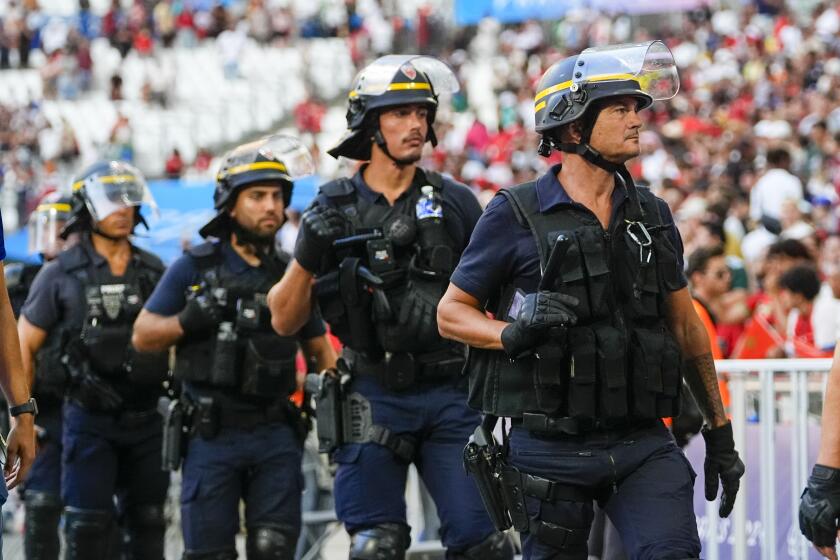Insight from an old rivalry
Kim Yu-Na knows figure skating history as well as she knows how to land crisp triple-triple jump combinations and bend her body into swift and supple spins, which is to say extraordinarily well.
The South Korean teenager, who performed a mesmerizing short program Friday to separate herself from the field at the world championships, is coached by Brian Orser, the Canadian entry in the “Battle of the Brians” that was played out at the 1988 Calgary Olympics. His nemesis was U.S. champion Brian Boitano, who won the gold medal on Canadian ice on the strength of a 5-4 judges’ decision in the free skate.
Kim hadn’t been born when Orser and Boitano traded world championships, but Orser has told her about the competitions he lost to Boitano and the ones he won and the thin margin that often made the difference.
He did it not out of egotism but to give her insight into the mental strength she will need as she tries to unseat reigning world champion Mao Asada of Japan, her most frequent and fervent rival.
“He was a very great skater many years ago. He really helps me to focus on my own programs,” Kim said Friday.
“He really knows what I feel in the competitions because of Brian-Brian, and I’m doing that now. So I think he’s a very good coach for me.”
Orser laughed at her name for that long-ago rivalry and chuckled again when told she had praised his coaching skills.
“Oh, good,” he said, smiling. “I still have a job.”
He has done his job brilliantly so far, transforming a 15-year-old girl who never smiled when she came to Toronto to seek his help into a polished and poised young woman whose smile and smooth assurance shone through in every move in her “Danse Macabre” program.
More than helping her with jumps or spins, he has taught her not to fear competition. Being pushed can topple you or make you stronger, and Kim doesn’t seem the toppling sort as long as Orser is there to guide her and make her feel calm in the most nerve-racking of situations.
“It’s just because knowing what I know as far as being through it,” he said. “Just how I went through it at that level and the Olympics and the rivalry and the job you need to do.
“When there’s somebody else in the rink that knows what you feel, who you can actually go, ‘OK, he knows what I feel,’ I think it’s comforting.”
She could scarcely have been more at home than she was on Friday, traversing the ice at Staples Center with lithe and lovely spirals and deft spins. She did get a warning for taking off on the wrong edge for her triple flip, but she still got a positive grade of execution for that jump, part of the record 76.12 points she earned.
Joannie Rochette of Canada was the only skater who didn’t get a single minus and she was a solid second with 67.90 points, sandwiched between Kim and a contrite Asada, who turned a planned triple lutz into a faulty double lutz and lost points there to finish with 66.06.
Rochette was strong and forceful but lacked the luminous quality Kim brought to the ice; Asada floated and flowed to “Clair de Lune” but lost to Kim by nearly a full point on the performance/execution segment of the program components and was beaten on every other segment too.
Orser, stationed at the sideboards, jumped every jump with her and swayed his arms in time with hers. His grades of execution might have been lower, but his emotions were no less heartfelt than hers.
“She was fierce and she was on the attack,” he said. “The technical aspects of her program were sensational, but she skated with her heart and soul. I’m very proud of her.”
As well he should be. She could crack the 200-point mark today, a level no woman has reached.
“It’s important we don’t get too hung up on being in the lead and the points,” he said. “We have to go out and skate a solid long program.
“I want her to skate with the same spirit she did today.”
As he spoke in a hallway not far from the ice, Boitano walked by. He’s here coaching U.S. women’s title holder Alissa Czisny, whose error-filled performance looked even worse compared with Kim’s magic.
“She was great,” Boitano said of Kim.
“Wasn’t she good?” Orser said.
“Oh, my God,” Boitano said, his enthusiasm genuine, able, now as then, to appreciate the merits of a wonderful rivalry that has reached its second generation.
--
More to Read
Go beyond the scoreboard
Get the latest on L.A.'s teams in the daily Sports Report newsletter.
You may occasionally receive promotional content from the Los Angeles Times.





